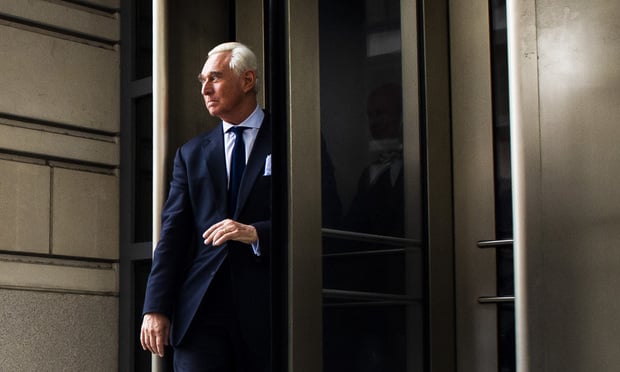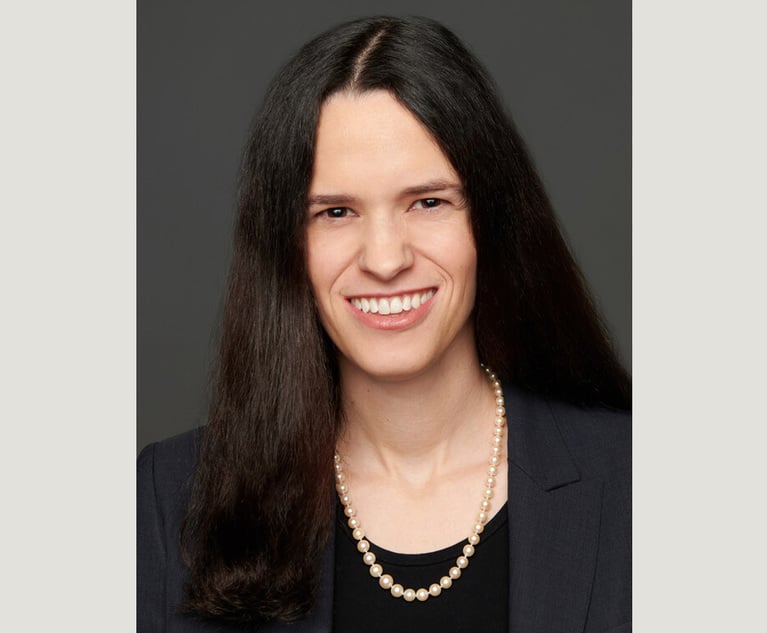Roger Stone's Lawyers Face Their Biggest Match Next: 12 DC Jurors
U.S. District Judge Amy Berman Jackson has hit Stone with gag orders and repeatedly chided him from the bench in the lead-up to trial.
November 02, 2019 at 06:00 PM
5 minute read
 Former Trump adviser Roger Stone, indicted by the team of special counsel Robert Mueller, departs federal court after attending his arraignment hearing, where he pleaded not guilty, in Washington, D.C., on Jan. 29, 2019. (Photo: Diego M. Radzinschi/ALM)
Former Trump adviser Roger Stone, indicted by the team of special counsel Robert Mueller, departs federal court after attending his arraignment hearing, where he pleaded not guilty, in Washington, D.C., on Jan. 29, 2019. (Photo: Diego M. Radzinschi/ALM)
Roger Stone, a longtime associate of President Donald Trump, is set to go to trial this week in a case that's expected to detail the campaign's contacts with WikiLeaks in the lead-up to the 2016 election.
It's been nine months since Stone's January arrest on charges of lying to Congress and witness tampering. But the build-up to his trial has been far from quiet, as the judge presiding over Stone's case has hit him with gag orders and repeatedly chided him from the bench.
"It seems he is determined to make himself the subject of a story," U.S. District Judge Amy Berman Jackson of the District of Columbia said of Stone during a scathing oral order in July, blocking him from using some social media.
Former federal prosecutors watching the case predicted that Stone's lawyers might deploy a familiar strategy during trial that they tried over the past few months: Make this case about a topic other than the charges against Stone. That's unlikely to go over well with Jackson, whose no-nonsense approach and demeanor has guided much of the pretrial proceedings.
Jackson has largely rejected attempts by Stone's legal team to introduce evidence on matters outside of Stone's charges of lying to Congress and witness tampering. That outside evidence has included cybersecurity firm Crowdstrike's reports on its discovery of Russian hackers breaching the Democratic National Committee's server.
Stone's legal team is led by the Fort Lauderdale, Florida-based attorneys Bruce Rogow and Robert Buschel.
"The maneuvering in the pretrial hearings suggest that the defense is very interested in making this a trial about something other than whether Roger Stone lied to Congress and tried to get other people either to lie or to refuse to testify," said David Sklansky, a former federal prosecutor and professor at Stanford Law School.
"And the judge seems determined to keep the trial focused on the allegations in the indictment," Sklansky added.
Stone is accused of lying to Congress, impeding a congressional investigation and witness tampering, including a charge that he threatened the dog of a now former associate to try and prevent that man from testifying with the House Intelligence Committee.
His trial will start with jury selection Tuesday, with opening statements expected either that day or early the next. The trial is expected to take about two weeks.
Stone pleaded not guilty to the charges, and made it clear from the start that he would fight the allegations. But he's largely lost those pretrial fights.
During a September hearing, Jackson balked at the possibility of Stone's attorneys asking witnesses about how special counsel Robert Mueller conducted his investigation.
"We're not going to try the investigators here, or the investigation," Jackson said at the time.
The trial is also sure to reveal further details about the Trump campaign's contacts with WikiLeaks. Stone claimed to have a back-channel to the group, as well as prior knowledge of released information damaging to Democrats ahead of the 2016 election.
"This was one of the biggest sources of redactions in the Mueller report," said Randall Eliason, a former assistant U.S. attorney for D.C. and a law professor at George Washington University. "We're going to learn some things that were redacted that we've been kind of wondering about."
Former Trump campaign leader and ex-White House chief strategist Stephen Bannon, who was purportedly in touch with Stone about the WikiLeaks dumps, is expected to take the stand as a government witness. He's expected to testify about how Stone tried to sell himself to the Trump campaign as having insider access to WikiLeaks.
Former Trump campaign official Rick Gates is also anticipated to testify during the trial. Court filings show that his sentencing, after pleading guilty to fraud-related charges, has been pushed off until after the proceedings are expected to end.
Also set to take the stand is Randy Credico, a former Stone associate who Stone claimed was his backchannel to WikiLeaks. Credico's attorney, Martin Stolar, said last spring that his client received a subpoena to appear on the first day of Stone's trial.
Credico—who was not Stone's alleged WikiLeaks contact—is referenced throughout the indictment. He is the man Stone allegedly threatened over potential testimony to the House Intelligence Committee.
But the other man who played a starring role in Stone's indictment, Jerome Corsi, does not appear likely to appear at the trial. Corsi's attorney, Larry Klayman, has said his client hasn't been subpoenaed or asked to testify.
Stone was the last person to be indicted by Mueller before the special counsel's probe shut down. The U.S. Attorney's Office for the District of Columbia took over the case once Mueller's probe concluded. A pair of Mueller holdovers, Adam Jed and Aaron Zelinsky, have stayed on the case.
This content has been archived. It is available through our partners, LexisNexis® and Bloomberg Law.
To view this content, please continue to their sites.
Not a Lexis Subscriber?
Subscribe Now
Not a Bloomberg Law Subscriber?
Subscribe Now
NOT FOR REPRINT
© 2025 ALM Global, LLC, All Rights Reserved. Request academic re-use from www.copyright.com. All other uses, submit a request to [email protected]. For more information visit Asset & Logo Licensing.
You Might Like
View All

In-House Moves of the Month: Boeing Loses Another Lawyer, HubSpot Legal Chief Out After 2 Years
5 minute read
After Regime Change, Syria Remains Liable in US Federal Courts for Alleged Assad-Era Terrorism Support
3 minute read
Trending Stories
- 1Snap Paid $63M in Fees to 2 Am Law 200 Firms in '24
- 2Lawyers Across Political Spectrum Launch Public Interest Team to Litigate Against Antisemitism
- 3Jones Day Names New Practice Leaders for Antitrust, Business and Tort Litigation and Latin America
- 4Russia’s Legal Sector Is Changing As Sanctions Take Their Toll
- 5Government Contracting Clients Look to Firms to Stay on Top of Trump Policy Changes
Who Got The Work
J. Brugh Lower of Gibbons has entered an appearance for industrial equipment supplier Devco Corporation in a pending trademark infringement lawsuit. The suit, accusing the defendant of selling knock-off Graco products, was filed Dec. 18 in New Jersey District Court by Rivkin Radler on behalf of Graco Inc. and Graco Minnesota. The case, assigned to U.S. District Judge Zahid N. Quraishi, is 3:24-cv-11294, Graco Inc. et al v. Devco Corporation.
Who Got The Work
Rebecca Maller-Stein and Kent A. Yalowitz of Arnold & Porter Kaye Scholer have entered their appearances for Hanaco Venture Capital and its executives, Lior Prosor and David Frankel, in a pending securities lawsuit. The action, filed on Dec. 24 in New York Southern District Court by Zell, Aron & Co. on behalf of Goldeneye Advisors, accuses the defendants of negligently and fraudulently managing the plaintiff's $1 million investment. The case, assigned to U.S. District Judge Vernon S. Broderick, is 1:24-cv-09918, Goldeneye Advisors, LLC v. Hanaco Venture Capital, Ltd. et al.
Who Got The Work
Attorneys from A&O Shearman has stepped in as defense counsel for Toronto-Dominion Bank and other defendants in a pending securities class action. The suit, filed Dec. 11 in New York Southern District Court by Bleichmar Fonti & Auld, accuses the defendants of concealing the bank's 'pervasive' deficiencies in regards to its compliance with the Bank Secrecy Act and the quality of its anti-money laundering controls. The case, assigned to U.S. District Judge Arun Subramanian, is 1:24-cv-09445, Gonzalez v. The Toronto-Dominion Bank et al.
Who Got The Work
Crown Castle International, a Pennsylvania company providing shared communications infrastructure, has turned to Luke D. Wolf of Gordon Rees Scully Mansukhani to fend off a pending breach-of-contract lawsuit. The court action, filed Nov. 25 in Michigan Eastern District Court by Hooper Hathaway PC on behalf of The Town Residences LLC, accuses Crown Castle of failing to transfer approximately $30,000 in utility payments from T-Mobile in breach of a roof-top lease and assignment agreement. The case, assigned to U.S. District Judge Susan K. Declercq, is 2:24-cv-13131, The Town Residences LLC v. T-Mobile US, Inc. et al.
Who Got The Work
Wilfred P. Coronato and Daniel M. Schwartz of McCarter & English have stepped in as defense counsel to Electrolux Home Products Inc. in a pending product liability lawsuit. The court action, filed Nov. 26 in New York Eastern District Court by Poulos Lopiccolo PC and Nagel Rice LLP on behalf of David Stern, alleges that the defendant's refrigerators’ drawers and shelving repeatedly break and fall apart within months after purchase. The case, assigned to U.S. District Judge Joan M. Azrack, is 2:24-cv-08204, Stern v. Electrolux Home Products, Inc.
Featured Firms
Law Offices of Gary Martin Hays & Associates, P.C.
(470) 294-1674
Law Offices of Mark E. Salomone
(857) 444-6468
Smith & Hassler
(713) 739-1250








